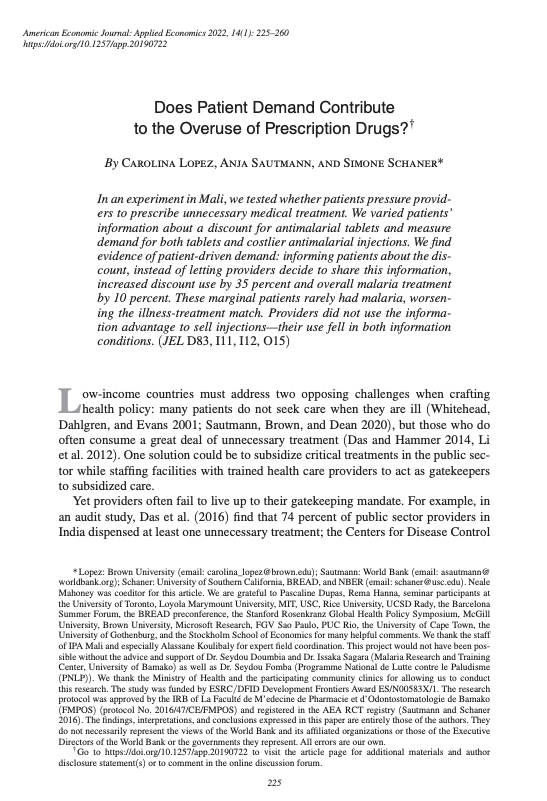Reproducibility package for Does Patient Demand Contribute to the Overuse of Prescription Drugs?
Overview
In an experiment in Mali, we tested whether patients pressure providers to prescribe unnecessary medical treatment. We varied patients’ information about a discount for antimalarial tablets and measure demand for both tablets and costlier antimalarial injections. We find evidence of patient-driven demand: informing patients about the discount, instead of letting providers decide to share this information, increased discount use by 35 percent and overall malaria treatment by 10 percent. These marginal patients rarely had malaria, worsening the illness-treatment match. Providers did not use the information advantage to sell injections—their use fell in both information conditions.
Reproducibility Package
| Name | URL |
|---|---|
| Creative Commons Attribution 4.0 International (CC BY 4.0) License | https://creativecommons.org/licenses/by/4.0/ |
| Repository name | URI |
|---|---|
| AEA Data and Code Repository | https://www.openicpsr.org/openicpsr/aea |
Reproducibility
This package was validated on an Intel(R) Core(TM) i5-8250U CPU @ 1.60GHz 1.80GHz, RAM 8.00 GB, 64-Bit operating system. Stata/MP 14.0.
A readme file with detailed instructions is part of the (external) reproducibility package. To run the entire master file, it took approximately 3 hs. and 20 min. under this environment.
Data
All data needed for replication is public. For the raw data, please visit the J-PAL DataVerse repository at https://doi.org/10.7910/DVN/CLGN7Z . To get access to these files, replicator must submit name, email, institution, position, and intended use of the files. Appendix "B.4 Variable Construction" describes how to create the variables used in the analysis.
Description
| Author | Affiliation | |
|---|---|---|
| Carolina Lopez | Brown University | carolina_lopez@brown.edu |
| Anja Sautmann | World Bank | asautmann@worldbank.org |
| Simone Schaner | University of Southern California, BREAD, and NBER | schaner@usc.edu |
We are grateful to Pascaline Dupas, Rema Hanna, seminar participants at the University of Toronto, Loyola Marymount University, MIT, USC, Rice University, UCSD Rady, the Barcelona Summer Forum, the BREAD preconference, the Stanford Rosenkranz Global Health Policy Symposium, McGill University, Brown University, Microsoft Research, FGV Sao Paulo, PUC Rio, the University of Cape Town, the University of Gothenburg, and the Stockholm School of Economics for many helpful comments. We thank the staff of IPA Mali and especially Alassane Koulibaly for expert field coordination. This project would not have been possible without the advice and support of Dr. Seydou Doumbia and Dr. Issaka Sagara (Malaria Research and Training Center, University of Bamako) as well as Dr. Seydou Fomba (Programme National de Lutte contre le Paludisme (PNLP)). We thank the Ministry of Health and the participating community clinics for allowing us to conduct this research.
2022-01
Scope and coverage
| Location | Code |
|---|---|
| Mali | MLI |
Disclaimer
The materials in the reproducibility packages are distributed as they were prepared by the staff of the International Bank for Reconstruction and Development/the World Bank. The findings, interpretations, and conclusions expressed in this event do not necessarily reflect the views of the World Bank, the Executive Directors of the World Bank, or the governments they represent. The World Bank does not guarantee the accuracy of the materials included in the reproducibility package.
Access and rights
| Name | URI |
|---|---|
| Creative Commons Attribution 4.0 International (CC BY 4.0) License | https://creativecommons.org/licenses/by/4.0/ |
Information on metadata
| Name | Abbreviation | Affiliation |
|---|---|---|
| Krestel | CK | World Bank |
2023-06-28
1
